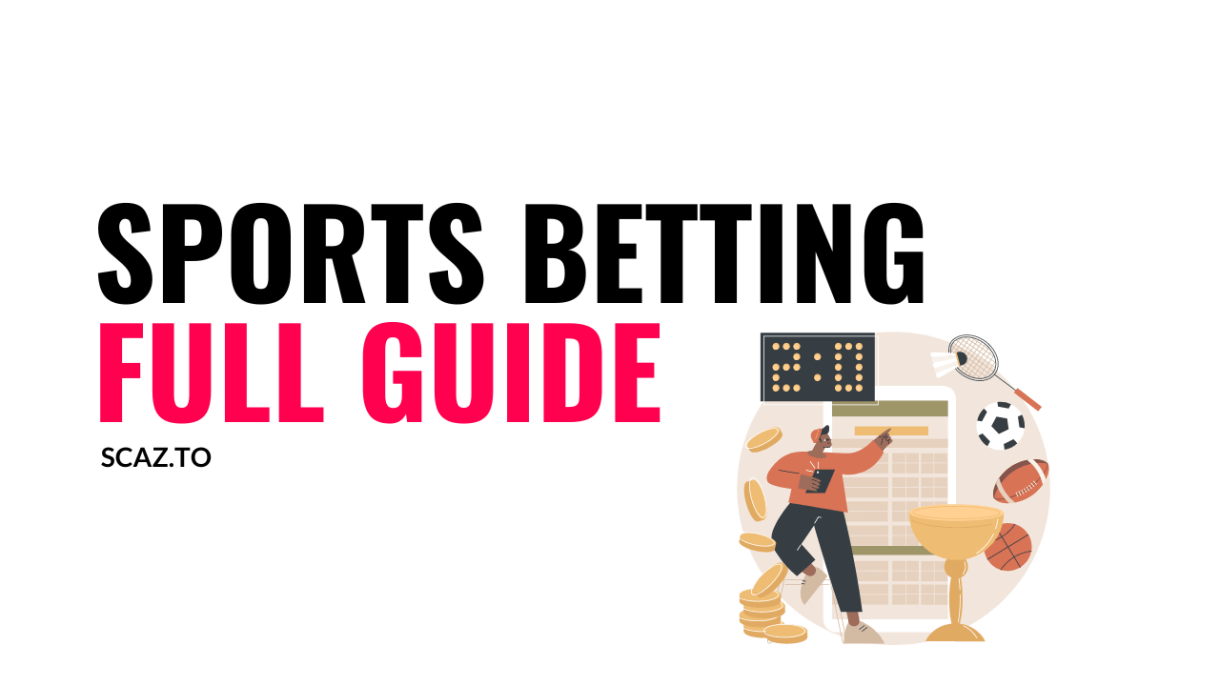How Investing and Sports Betting Differ
The days of handing over a cash envelope to a dodgy individual in an alley are long gone. Sportsbooks are multibillion-dollar software corporations that enable you to safely place bets on your laptop or smartphone. The entire sports betting procedure is straightforward, high-tech, and legal, and sites are designed to provide clients with exceptional experiences.
The global market capitalization for sports betting is projected to be just about $60 billion per year. Sports betting provides billions of dollars in genuine, pure riches for both sportsbook employees and millions of bettors worldwide. Doesn’t that sound like the stock market?
At their most fundamental, base level, sports betting and the stock market both reward individuals who successfully predict the future. Sports betting, like the stock market, isn’t only about winning and losing (ie. stock prices going up and down). There are numerous products meant to provide hedges for bettors (or investors), increase market liquidity, and make markets more efficient for their participants. The differences between a call option and a futures bet is not significant.
- Investing and gambling both involve risking capital in the hopes of making a profit.
- In both gambling and investing, a key principle is to minimize risk while maximizing reward.
My First Observations
How was this game conceived, ie. what did those who created it count on?
Mainly yours:
1) Impatience
2) Immoderation
3) Non-objectivity
4) Ignorance
1) In a psychological sense, the desire of each of us to play a ticket with pairs that are played on the same day as the payment is understandable, in order to withdraw the money immediately after the matches are over or possibly tomorrow. A nice idea but relatively rarely achievable, so it’s now or tomorrow is never. Don’t just watch the matches that happen on the same day, but watch everything that will be played in the following weeks, it will be much easier for you to compile winning tickets.
2) Instead of playing a ticket with 4, 5, 6, or 7 pairs (how many you decided at the start) you usually insert at least one more pair to increase the odds and very often you lose on that one. Be modest and try to control yourself – if you decided to play a ticket with 4 pairs – then play those 4 matches and nothing more.
3) You are an ardent fan of a team, but if that team is no longer in the form it was in, for example, last year (harsh reality), then don’t bet on it or any other team you are emotionally attached to – because then you won’t be OBJECTIVE – and you will hardly guess.
4) Your ignorance is the result of a lack of information. Let’s say: You played 1 on the favorite, but you didn’t carefully read all the possible newspapers, listened to the radio, or watched TV, you didn’t “consult” internet, so you didn’t know the following:
- The home team (favorite) is served justice by the referee, with whom that team has been in bad relations for a long time,
- A key defensive player takes a break due to two yellow cards,
- Center forward and leading goal scorer is injured and will not play,
- The home team has a 12-point advantage over the second-placed team, and there are 4 more rounds left until the end of the championship, so they can sell points or play a draw and bury you.
How do Bookies Work?
On the (one) only possible principle: HONESTY.
If something is honest, then it’s betting! You can play a ticket that brings you the maximum amount that the bookmaker pays out, and the same ticket can be played by several players (whom you don’t know), what will happen? The bookmaker will pay all players exactly what each ticket brings.
What is Betting?
Betting is a game of chance in which you guess the outcomes of sports and other events. Someone bet on the sports result, someone on the outcome of the election for the president of Serbia. The profit depends on how accurately you predicted the outcome of the event you bet on. The amount of winnings is the product of the odds and the amount of stakes. As I said, you choose the events and types you want to bet on from the bookmaker’s offer. Then (again by yourself) you determine the amount you invest and immediately find out the profit you will achieve, of course, if you guess the outcomes of the events you bet on.
How to Read & Calculate Sports Odds
Understanding how to read the odds is a crucial step in becoming a successful sports bettor. From determining how much money you want to wager to figuring out which bets offer the most value, it all starts with a solid understanding of odds.
What Are American, Decimal, & Fractional Odds?
Odds are displayed in either American, decimal or fractional format and serve two purposes:
- They signal the implied probability of the outcome they are attached to
- They indicate how much money you could win betting on that outcome
Be careful about relying on odds alone when evaluating the likelihood of an event occurring. Odds are influenced by more than the factors that are actually relevant to the outcome of the event.
Your sports book may manipulate the odds to incentivize bets on a particular side, and the sum of the probabilities for a single event will always exceed 100 percent because the sportsbook takes a cut that is baked directly into the odds.
The odds also tell you how much the book will charge to take your bet. You may hear bettors refer to this amount as “the juice” or “cut” or “vig(orish)”.
American Odds Explained
If you see -150, +230, or any other three-digit number with a +/- in front of it, you’re looking at American odds.
What Do the + and – Mean in Sports Betting?
The – and + on a sports betting line indicate both your expected payout and whether you’re betting on the favorite or the underdog.
Negative numbers indicate the favorite on the line. The negative number indicates how much you’d have to bet to win $100.
If the number is positive, you’re looking at the underdog, and the number refers to the amount of money you’ll win if you bet $100.
Example:

Many popular wagers, including most point spread bets, have both sides with negative odds. Because the point spread is used to level the playing field between two sides, you often have to risk more than you profit when betting on the spread.
In order to win $100 on the Villarreal (favorites), you’ll need to wager $152. If you wagered $100 on the Getate (underdogs), you’d be set to win $500.
Decimal Odds Explained
Of the three types of odds you will encounter in your betting endeavors, decimal odds are the easiest to work with. Decimal odds are displayed as shown below:

Determining your payout with decimal odds is simple: simply multiply your bet by the odds associated with the team you are betting on. To calculate your winnings, subtract your original bet from the payout.
If you bet $100 on Villarreal you will win $166 ($66 profit and $100 bet), if you bet $100 on Getafe you will win $600 ($500 profit and $100 bet).
Fractional Odds Explained
Finally, let’s move on to fractional odds, which are commonly used in the UK and when betting on horse races.
These are the funny-looking odds-like 9/5 or 1/2-that you see when you bet on the Kentucky Derby. Pro tip: If you want to say out loud fractional odds like 9/5 or 1/2, you would say “nine to five” or “one to two”.
The number on the left (9) tells you how many times the book expects the outcome to fail, while the number on the right (5) tells you how many times the outcome is expected to succeed.
Let’s say boxer Gennady Golovkin is given 8/13 odds in an upcoming fight with Canelo Alvarez. These odds suggest that if this fight were to occur 21 times (8 + 13), Golovkin would lose 8 fights and win 13.
To calculate the implied probability of Golovkin winning the fight, take the number of times he is expected to win (13) and divide it by the total number of attempts (21). This results in a 61.9% chance that Golovkin will win the fight.
To calculate Alvarez’s probability of winning the fight, we do the same thing. Let’s say, hypothetically, that the odds are 11/8, meaning that if the fight were to occur 19 times (11 + 8), Alvarez would lose 11 times and win 8 times.
Therefore, the probability of Alvarez winning the fight is calculated by dividing 8 (the number of times he would win) by 19 (the total number of attempts). Alvarez has a 42.1% chance of winning the fight.
Remember what we said earlier about the “juice” or “vig”? It doesn’t go away just because the book shows the odds differently. We haven’t even factored in the probability of a tie, and the sum of the probabilities is already over 100% (61.9 + 42.1 = 104).
The implied probabilities of both outcomes added together will be greater than 100% regardless of the odds format. Unfortunately, you have to pay to play.
If you want to bet on Golovkin to win the fight (8/13 odds), you calculate your winnings by multiplying your bet by the quotient of 8 ÷ 13 (0.615). If you bet $10, your winnings would be $6.15 (10 x 0.615). In this case, you’ll get back $16.15 ($10 bet + $6.15 winnings).
If you wanted to bet your $10 on Alvarez, you would multiply that amount by the quotient of 11 ÷ 8 (1.375). Your winnings would be $13.75 ($10 x 1.375).
Your payout would be $23.75 ($10 initial bet + your winnings of $13.75).
The potential winnings are greater when betting on Alvarez, the “underdog” in this fight. Betting on underdogs in any sport usually allows you to risk less in order to win more. However, remember that they are underdogs for a reason, whether it’s a rookie season, a recent injury, or serious competition.
If you side with Golovkin, the “favorite,” you’ll have to risk more to get the same return.
What can you play?
FINAL OUTCOME
For the final outcome – football, basketball, water polo and hockey, we have three variants that we can play: 1, X and 2, and for tennis and volleyball we have two variants: 1 and 2. When it comes to football, the three final variants are:
a) 1 (ace) – means that we predict the victory of the home team,
b) X (iks) – means that we predict a draw
c) 2 (two) – means that we predict the victory of the guest.
HALFTIME-END
With this game, we have nine variants, i.e. possible types:
a) 1-1 (means that we predict that the home team will win both the half-time and the game)
b) 1-X (means that we predict that the home team will win the first half and that the match will end in a draw)
c) 1-2 (means we predict that the home team will win the first half and the away team will win in the end)
d) X-1 (means that we predict that the first half will end in a draw, and that the home fans will, in the end, go home happy)
e) X-X (means that we assume that both the first half and the end of the game will end in a draw)
f) X-2 (means we think the first half will end in a draw, and the away team will win in the end)
d) 2-1 (means that we believe that the guest will win the first half, and the home team will celebrate in the end)
h) 2-X (means that the guest will win the first half, and the match will end in a draw)
i) 2-2 (means that the first half as well as the end of the game will belong to the visiting team)
TOTAL GOALS PER MATCH
There are also several variants in the goal game:
a) First half 1+ (means that at least 1 or more goals will be scored in the first half)
b) First half 2+ (means that 2 or more goals will be scored in the first half)
c) 0-1 (means that a maximum of 1 goal will be scored in that match)
d) 0-2 (means that a maximum of 2 goals will be scored)
e) 2-3 (means that a minimum of 2 and a maximum of 3 goals will be scored)
f) 3+ (means that a minimum of 3 or more goals will be scored)
d) 4+ (means that a minimum of 4 or more goals will be scored)
h) 4-6 (means that a minimum of 4 and a maximum of 6 goals will be scored)
i) 5+ (means that a minimum of 5 or more goals will be scored)
j) 7+ (means that a minimum of 7 or more goals will be scored)
k) 2+ in the second half (it means that in that game, in a goal, and the quota for that is 25%, the second half will fall at least lower than the quota for 2+ in the first half).
DOUBLE CHANCE
With double chance, three combinations are possible:
a) for the home team to win or be tied (1 X)
b) for the host or guest to win (12)
c) to be tied or for the guest to win (X 2)
GIVE-NOT GIVE A GOAL
NOTE: This game is only represented in some bookmakers. In this game, we have four possibilities, that is, variants:
a) that the home team scores at least one goal in the match
b) that the home team does not score a single goal in the match
c) that the guest scores at least one goal in the match
d) that the guest does not score a single goal in the entire match
FIRST HALFTIME
This is an interesting game because the odds for 1 or 2 are much stronger than for the final 1 or 2, and the odds for X IP (X first half) are usually 1.90 which is very nice odds – especially when you find teams that as home or away most often they start from X I half time.
There are three possibilities (variants) for this game:
a)1 I half. (this means we assume the host will win the first halftime)
b)X I half. (this means we think the first half will end tie)
c)2 I half. (this means we believe the guest will get the first half-time)
FIRST TO GIVE A GOAL
NOTE: This game is only represented in some bookmakers.
In this game, there are also three variants:
a) 1 (means that the home team will score first),
b) 0:0 (means that the match will end with a score of 0:0, and here the odds are mostly from 6.00 to 90.00)
c) 2 (means that the guest will score first).
HANDICAP MATCHES
With this game, we have three options, ie. three final solutions, with the fact that here the bookmaker gives an advantage (most often by one goal) to the host or guest:
a) 1 (means that the home team will emerge as the winner in the final total, i.e. if the bookmaker gave the guest an advantage of one goal, then the home team must end the match with a victory of at least 2 goals, so that in the handicap game – the home team would be the winner – i.e., to finally end the match: 1
b) X (means that the match will end in a draw in the final total)
c) 2 (means that the match will end with the victory of the guest in the final total)
WHO GOES NEXT
This game is interesting because there are only two final solutions:
a) 1 (means that we predict that the host will advance to the next round of competition)
b) 2 (means that we predict that the guest will advance to the next round of competition)
TOTAL GOALS PER LEAGUE
This game is also very rewarding because we only have two final options in it:
a) Example: If the list says 18 – it means that 18 or fewer goals will be scored in that round (in that league)
b) Example: If the list says 19+, it means that 19 or more goals will be scored in that round (in that league)
The odds for this game are from 1.80 to 1.85.
WINNER OF SOME COMPETITION
This can only be played as a SINGLE, and here we predict
the winner of a competition.
MORE GOALS FALL
This game is extremely attractive, and there are three variants:
a) 1> (means that more goals will be scored in the first half, and the odds for this are from 3.45 to 3.50, depending on the bookmaker),
b) 1-2 (means that the same number of goals will be scored in the first and second half, and the odds for this are 3.25) and
c) 2> (means that more goals will be scored in the second half, and the odds for this are 1.75).
How to be Better at Betting?
Things to keep in mind when playing:
1) A team that was expected (realistically) to win away from home, and it loses, is very likely to play the next game it plays at home with maximum commitment and WIN even a team that is realistically BETTER to make up for the previous failure .
2) The team that has not won on its home ground for a long time (according to the theory of probability) is getting closer to the moment when it will FINALLY WIN at home.
3) The team that “destroys” as a HOME should be used to the maximum when playing at home, even if once after 5, 6, 7, or 8 games they FAIL (i.e. DON’T WIN), that team has brought us enough money by then.
4) If a team is in crisis and there is a change of coach, at the insistence of primarily the PLAYERS, but also the audience and management: ALMOST SURE They will do their best in the first match and play maximally well (meaning they will go for the win) in order to show how bad the FORMER coach really was, ie. that they were right (when they asked for his REPLACEMENT).
5) In a match where the HOST is at the top of the table and the GUEST is at the bottom, it is best to play GOALS: 4+, 4-6, 5+, and of course consult the statistics first.
6) The reverse of the first recommendation: the team that should have won at home and he loses will probably try to win already in the next round.
7) A team that moved from a LOWER to a HIGHER ranking of the competition, holds up very well for a while, but when it starts to SHOT – then (probably due to inexperience) problems arise, a crisis – and that team SLOWLY AND SURELY SINKS.
8) Whenever you have time – watch a few matches on TV and ALWAYS write down what’s important (say, note SOME PLAYER, or GENERAL IMPRESSION OF SOME TEAM, etc.).
General Distribution of Tickets
In principle, there are two basic types of tickets:
1. In Head (means that you have to guess all the pairs you played for the ticket to “pass”. The winnings in the IN HEAD ticket are calculated by multiplying the product of the odds of all pairs by the amount invested.
2. Systematic (System means that you have a condition on the ticket that you must fulfill in order for the ticket to “pass”). The gain here is calculated by:
a) Divide the invested sum of money by the number of combinations, so you get the value of one combination. Multiply that by the odds for each hit pair (if the System is 2/5 then we multiply the odds for every 2 hit pairs).
b) Divide the product of the odds for the affected pairs of the requested SYSTEM (if the system is 3/5, then we multiply the odds for 3 pairs) by the total number of combinations, and multiply the obtained number by the invested amount.
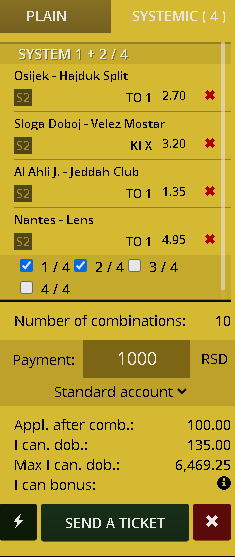
What Every Professional Does
Counter means to play a ticket on one of the two possible outcomes of a duel so that on one of the two tickets we have a 100% hit (if on the first, i.e., basic ticket, you played 1, then on the single ticket you will play counter double chance (x2) or if you played 0-2 goals on the basic ticket, on the single ticket, i.e. contribute you play 3+).
What do you achieve by doing this? You achieve that if your main ticket falls, the ticket where you countered wins you money.
Example:
Main Ticket:
Bet: 100$ Odds:32 Win:3200$
You have one more match left to win this ticket, you played 1X (Home team or Draw at the end of the (football)match), on that match you can play one more ticket, where you bet on 2 (Away team win) (Where for example odds are 2,40), so you bet 1000$ there.
Your second ticket:
Bet: 1000$ Odds:2,40 Win:2400$
This way even if your last match falls you will win money.
Strategies That my Friends Who Make a Living From Betting Play
First ticket (according to Janko), a B.Sc. philosopher, who claims:
“Absolutely everything is relative, except relativity itself, which is
absolute”. Man plays with thoughts and words, and it’s not that he’s not right.
You find 3 teams that both as hosts and as guests very often finally play X. Week after week you play the same 3 teams regardless of who and where they play that the final outcome will be X (odds 3.00), but by increasing the bet.
You can, in the beginning, invest more or less money and also increase the amount you invest every next week at a faster pace. If you like the system – make YOUR own calculation and try it.
A lot less profit but much safer, I found success in this strategy by playing it with only one or a maximum of two pairs. When I played with three, I only managed to win on the 27th ticket. I needed a big bank to reach my goal.
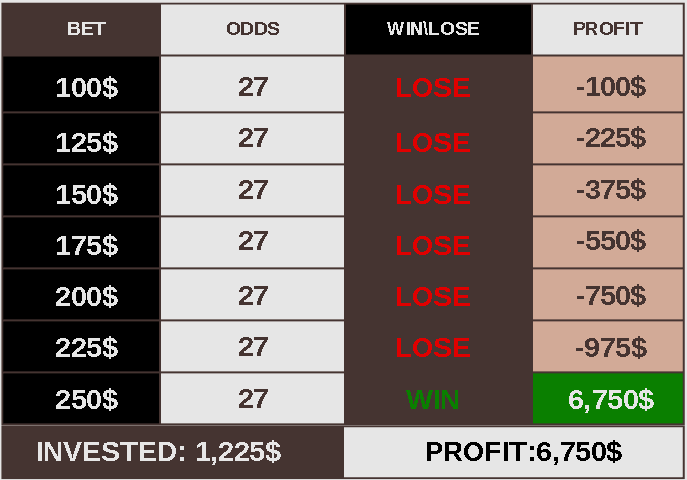
The second ticket (according to Marko), now my godfather, and once inseparable in the game 2 against 2 on small goals:
The principle is the same, but it differs from the previous one in a shade (the winnings are bigger).
You will find 3 teams that often play both as hosts and as guests:
More goals in the first half (1>) where the odds are 3.45-3.50, we play again from round to round. You invest at the same rate as with the previous system, so:
a) If you happen to win in the first round, then your winnings are 41.06 x $100 = $4,106 and then you continue playing from the beginning.
b) If it happens that the ticket passes only in the seventh round, then the winnings are 41.06 x $250 = $10,265, and from that, you subtract the total amount invested until then = $1,175. So you get NET earnings, which is 10,265.00-1,175.00 = $9,090.00
I haven’t played this strategy yet but it seems easier than Janko’s strategy, it also has better odds. Be aware that for these strategies you need to have a big big budget to cover all the steps until you win.
The third ticket (according to Papa), the blues master, the inevitable “problem”, from the basketball days, in the 1-on-1 game.
There are some players who, like Papa, have been playing for years according to the principle: The fewer pairs – the less possibility to make a mistake(which is correct), so they find 6-7 home or guests and play 3 mix tickets with 4 pairs each. If the average odds for all these pairs is 1.50 and only one ticket passes, you have returned your invested money and earned a little (depending on how much you bet per ticket) because per ticket = 5 (4 pairs each with odds 1.50 average) average odds, Some with more money play only such simple systems and invest $1000 per ticket, If 2 tickets go through, there’s $10,000 for them. Very simple.
Fun Strategy that i Found on Internet
Surfing, and contacting players from all over the world, I worked out the following idea: For the vast majority of people who play (bet), relatively often it happens that they miss only one or two matches (so close and so far). Sometimes you are knocked down by only 1 goal (surplus or deficit), but you continue the game in the hope of winning in the next round. When it’s already like that, and it’s like that – what can be done better? You can play with time, don’t chase the result, and it will sooner or later – come into your hands. For this game, you need some knowledge, a little patience, and a little more money (but certainly not more than you spend on average per week at the bookmaker). What should be done? I suggest you find 10-12 teams, in whose matches more goals are scored in the first half relatively often (1>). From those 12 teams, make a choice of 8 teams, so that one week you have 4 teams for this type of game and the next week another 4 teams (when some are home, others are guests and vice versa), so you can play every week.
What to do?
The first time you play this type of ticket, you pay $100. The second time you pay $125 on a ticket with the same 4 selected teams. Third-time deposit $150, etc. I only gave this as an example, I recommend you playing with less money ($ 1-10), considering that this is just a system for entertainment.
I recommend you to do this with a double (Two matches) as it greatly decreases the risk even though the ending profit is smaller.
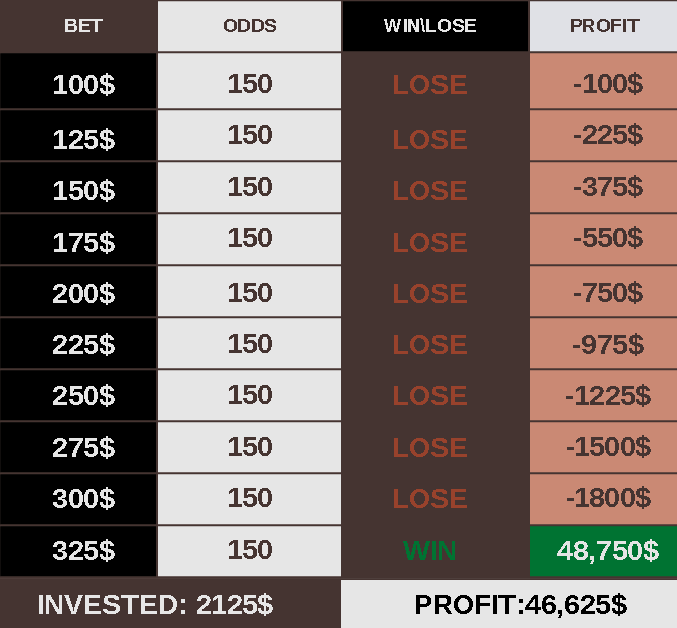
Internet Betting Terminology
This is a list of the most common terms you can find on betting sites and online bookmakers that you probably aren’t 100% sure what they mean.
Accumulator
An accumulator is a combination of pairs where all pairs must be hit to win a bet.
Asian Handicap
It is used to balance the two sides and prevent the game from being tied.
A banker
A banker is a pair that you feel is safe and that you trust to be correct.
Bookie
The bookmaker. The bookmaker or the person who takes your bets. Also known as the ENEMY.
Dog
Underdog. A team with a much weaker reputation, lower leagues, etc.
Double
A bet consisting of two matches.
Favorites
The team that the bookies think is most likely to win. They usually have lower coefficients than they should.
Fivefold
A bet consisting of five games.
Form
Form.
Fourfold
A bet consisting of four games.
Home Dog
The home team is also the underdog.
Home Favorites
The home team is the favorite in the match.
Lengthen
When bookmakers give better odds to encourage players to bet on an event.
Heinz
Six pairs that combine into 15 doubles, 20 trebles, 15 fourfolds, 6 five-folds and 1 sixfold bet. A total of 57 bets.
Lucky 15
Four pairs, with four singles, six doubles, four trebles, and one fourfold bet, for a total of 15 bets.
Lucky 31
Five pairs, with 5 singles, 10 doubles, 10 trebles, 5 fourfolds, and 1 fivefold bet, 31 in total.
Lucky 63
Six pairs with 6 singles, 15 doubles, 20 trebles, 15 fourfolds, 6 five-folds, and 1 sixfold bet, 63 in total.
Odds
Coefficients.
Parlay
American name for the accumulator.
Patent
Three matches, with 3 singles, 3 doubles, and 1 treble bet, a total of 7 bets.
Sixfold
A bet consisting of six games.
Super Heinz
Seven pairs with 21 doubles, 35 trebles, 35 fourfolds, 21 five-folds, 7 six-folds, and 1 sevenfold bet, 120 in total.\
Treble
Three matches bet.
Trixie
Three pairs, with three doubles and one treble bet, 4 bets in total.
Probability
Here you can see how the probability of certain outcomes is calculated from betting odds. We will show it on the example of a football match.
1st step: Calculation of profit indicators
The profit indicator shows how much the bookmaker earns every time it pays out 10 dollars.
Example:
1 – Lens Wins, Odds 2.70
X – Draw, Odds 2.90
2 – Parma Wins, Odds 2.50
Profit indicator = 1/2.70 + 1/2.90 + 1/2.50 = 0.3704 + 0.3448 + 0.4 = 1.115
In this case, the bookmaker earns $11.15. for every $10 you pay out (of course, in case of an even schedule of payments).
2nd step: Calculation of the payout percentage
If the bookmaker receives bets in the correct ratio, then the percentage of payout to the players will be
Payout % = 100% x 1/profit indicator
Example:
Payout % = 100% x 1/1.115= 89.69%
3rd step: Calculation of the probability of the outcome
In the last step, the bookmaker’s price for each of the three possible outcomes should be multiplied by the payout percentage. That eliminates part of the price, which is the bookmaker’s profit and leaves an element of probability.
This calculation shows how to calculate the probability from the odds obtained in the bookmaker. Of course, that probability doesn’t have to be exact. When you calculate a different probability, then you have a good chance to put your money in the bet.
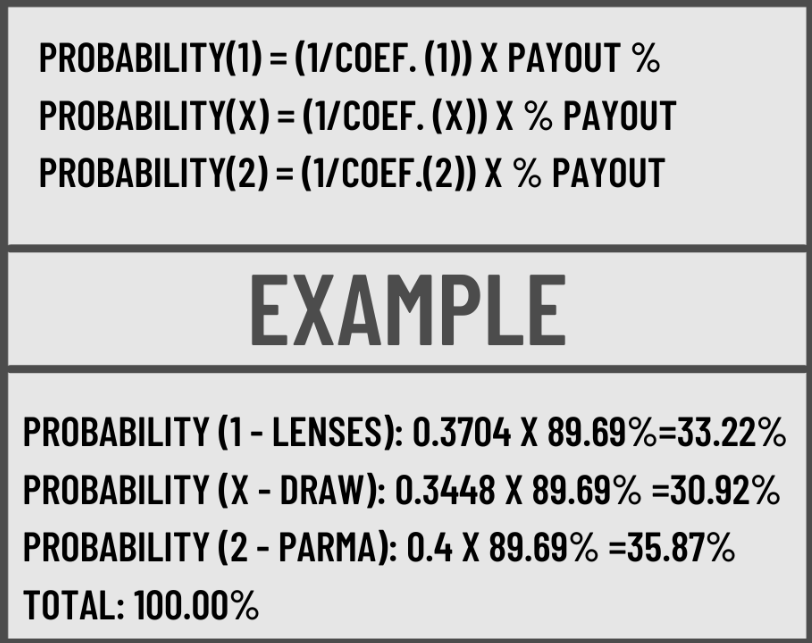
Notes
Notes: Slease read each sentence carefully, because I have not given a lot of it in the form of a schematic display of the ticket, it is just stated verbally as a reason you can note!
- Before making a final tip: look at the bookmaker’s odds; if the odds in Italy (series A) for 3+ are 1.50 and the odds for the other pairs are around 1.70 then that is – the right pair for the game 3+ (because the bookmaker will not give the odds 1.80 for a pair where most likely expect a lot of goals) look at the goal difference between the host (when playing at home) and the guest (when playing away), so if both teams in both cases give and receive more than 3 goals, then it is realistic to expect that they will play now as well for 3+. look at the situation in the table because the first team, that is, the one that almost secured the first place can play with the outsider: with few goals or sell a point or two, (because nothing bothers them) and thus destroy your ticket.
- Look at the TV set during some news and see what the weather forecast is for the part of the continent where the game you are interested in will be played (if rain is expected, the pitch will be wet and difficult to play on).
- Pay attention to the rise or fall of a team’s form recently. look at how the host played the previous game as a guest (if he was “destroyed”, then expect him to do his best now, to redeem himself in front of his audience, and to win.
- See who the referee is because no matter how he should be objective, he will always sympathize with someone more and someone less, so he will damage the other one at least for an out, a foul, a corner.
- Be careful if any key player is absent due to injury.
- The game of goals is one of the most interesting games and you should become an expert in it (it can bring you a lot) because in this game you are not interested in whether the host will score more goals and win, or the guest, rather, it is only important that there are as many of them as you like, 0-2, 3+, 4-6, etc.


